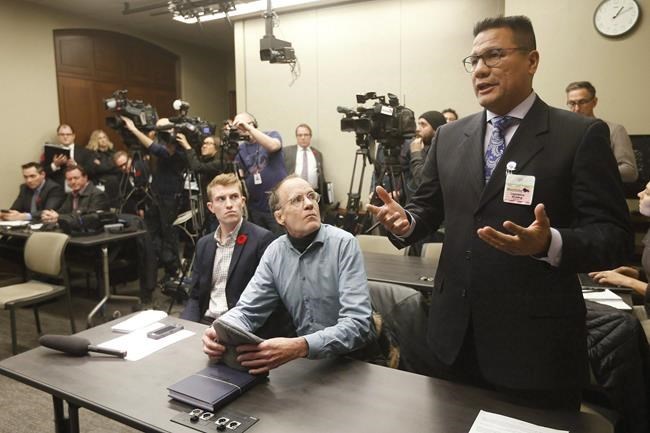
Onekanew (Chief) at Opaskwayak Cree Nation, Christian Sinclair, asks Manitoba Premier Brian Pallister a question at the Manitoba Legislature in Winnipeg on November 7, 2017. A Manitoba First Nation has begun the process to create its on child welfare system under controversial federal legislation that allows Indigenous groups jurisdiction to enact their own laws. Opaskwayak Cree Nation has retained a Winnipeg law firm and will be conducting consultations with members in the upcoming months to develop the law to take charge of their children in care. "The imposition of federal and provincial laws on Opaskwayak children and families has not worked for us," said Christian Sinclair, the onekanew, or chief of the First Nation on Wednesday. THE CANADIAN PRESS/John Woods
July 29, 2020 - 3:37 PM
WINNIPEG - A Manitoba First Nation has begun the process of creating its own child welfare system under controversial federal legislation that allows Indigenous groups to enact their own laws.
Opaskwayak Cree Nation has retained a Winnipeg law firm and says it will consult with members in the coming months to develop the law to take charge of their children in care.
"The imposition of federal and provincial laws on Opaskwayak children and families has not worked for us," said Christian Sinclair, the onekanew, or chief of the First Nation on Wednesday.
Bill C-92, which includes a massive overhaul of Indigenous child welfare across the country, came into effect in January.
Indigenous groups are to give notice of their intent to exercise jurisdiction or request a tripartite co-ordination agreement with the federal and provincial governments. They would develop or implement existing laws related to child welfare and those would prevail over federal and provincial laws.
There is no funding attached to the legislation, but the federal government signed an agreement with the Assembly of First Nations earlier this month to establish a "joint fiscal table." It was described as a forum for Ottawa and First Nations to negotiate funding agreements for communities that develop their own child welfare laws.
"Whatever the cost was going to be we are fully prepared to do it because we are talking about nationhood, the well being of our nation," Sinclair said.
He said the First Nation is looking at spending around $500,000 of its own funding to develop the law. He acknowledged it may be more difficult for other First Nations without the same level of membership or funds.
There are about 130 Opaskwayak on-reserve children in care and roughly 65 off reserve. The community is about 625 kilometres northwest of Winnipeg near The Pas.
Sinclair said the community will develop what's called Wahkohtowin law, based on their own laws as Ininewak people. It will focus on prevention as well as rebuilding and maintaining healthy families.
Indigenous Services Canada said last month that the department had received letters or documents from 24 Indigenous communities across the country requesting jurisdiction or showing interest in moving in that direction. It did not say whether they include any others in Manitoba. The department said at the time it was working with communities to identify next steps.
The Assembly of Manitoba Chiefs has previously criticized the federal law saying it missed key pieces to protect children. The group instead wanted approval to implement its own child welfare legislation.
The federal bill also requires consultation with the province to take over jurisdiction.
"It doesn't matter what the province thinks or the feds … Everything that they've ever tried to do or impose or implement on us has never worked, and it never will because it misses the spirit and intents of how we approach things as a nation," Sinclair said.
Manitoba's families minister has slammed the legislation and its rollout. Heather Stefanson has said work needs to be done to reduce the number of children in care. She said Ottawa's plan is not clear and could leave children at risk of falling through the cracks.
Stefanson has voiced concerns about children connected to multiple communities, data sharing between agencies and how the federal government will ensure equity in care.
There are about 10,000 children in care in Manitoba and about 90 per cent are Indigenous.
The final draft of Opaskwayak's child welfare law is expected to be completed in October. The community then plans to give notice to the federal government to enter into a "Co-ordination Agreement," which would ensure that financial arrangements are in place to implement it in a year.
"Opaskwayak refuses to inherit the appalling funding inequities of the current child welfare system," Sinclair said.
Harold Cochrane, one of the lawyers assisting in drafting the law, said it will have a large impact on the community. He said current child welfare is apprehension based and pits families against the system.
Overhauling the system will not be easy but is necessary, he said.
"The system that has been imposed on our people for decades has broken our families in a lot of ways and we need a system that is responsive to that rather than one that is adversarial."
This report by The Canadian Press was first published July 30, 2020.
News from © The Canadian Press, 2020